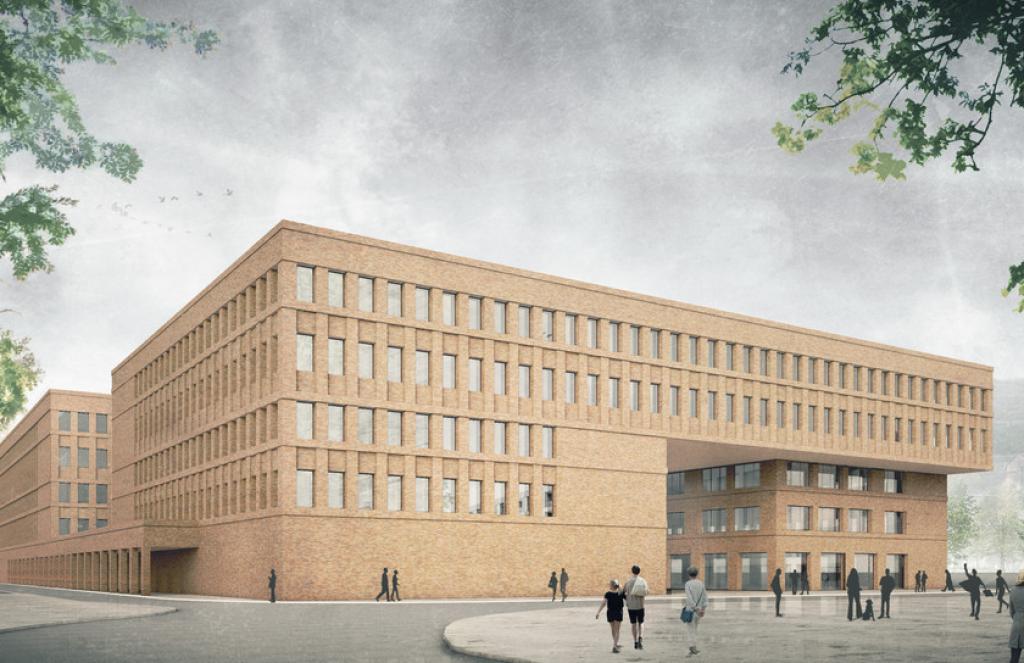Thessaloniki gets ready for its metro launch in November
The underground rapid transit lines have been under construction for almost two decades due to various project delays
 TheMayor.EU logo
TheMayor.EU logo 
A visualisation of the new campus buildings, Source: Bär, Stadelmann, Stöcker Architects and Urban Planners PartGmbB
The project envisions a multi-layered energy efficiency strategy, by harvesting a third of its heat from this unusual source
Yesterday, state officials from Baden-Württemberg laid the foundation stone of a new energy-efficient future-proof campus building in Esslingen, Germany. Construction on the new building is set to finish in 2025 and should become a beacon of sustainability for educational buildings. The new development will replace the campus of the Esslingen University of Applied Sciences.
The finished campus will be called Neue Weststadt and will harness the waste heat from the server room to power its own heating system. Coupled with the silver energy efficiency status on the building, a local supply of green hydrogen and a photovoltaic roof, the above should make it be one of the greenest university campuses in the country.
The project calls for a total of four new buildings with high-quality insulation, which should bring the campuses energy efficiency certificate to at least ‘Silver’ grade. Furthermore, using an innovative concept, the Esslingen University of Applied Sciences will source a third of its heat from IT servers.
The remaining two-thirds will come from the local heating company, Green Hydrogen Esslingen GmbH, producing green hydrogen. The waste product of hydrogen production is water. The ‘green’ adjective refers to the fact that that hydrogen is produced with green energy.
Specifically, the company uses waste heat from converting renewable energy into hydrogen, to apply heat to the whole district where the new campus will be built.
Furthermore, the roofs of the new campus, with 7,000 square meters of surface, will be fitted with solar panels. The photovoltaic system should be capable of generating 500 kilowatts at peak production, to feed the university’s energy demands.
With the project set to complete in 2025, the state-of-the-art university campus will be almost 100% climate-neutral, thanks to additional green spaces and a ban on cars on campus grounds. Baden-Württemberg has invested around 146 million euros into the project.
Ministerial Director in the Ministry of Science, Research and the Arts, Dr Hans J. Reiter was quoted in a press release saying: “With the new building, the reform initiated by the Esslingen University of Applied Sciences to restructure the faculties and central scientific institutions is also taking shape externally. In the future, it will be the visible and distinctive entrance gate to the university town of Esslingen."

The underground rapid transit lines have been under construction for almost two decades due to various project delays

Now you can get your wine in Talence by paying directly in Bitcoin

That’s because the state has to spend money on updating the railway infrastructure rather than subsidizing the cost of the popular pass

Rethinking renewable energy sources for the urban landscape

The examples, compiled by Beyond Fossil Fuels, can inform and inspire communities and entrepreneurs that still feel trepidation at the prospect of energy transition

Now you can get your wine in Talence by paying directly in Bitcoin

The 10th European Conference on Sustainable Cities and Towns (ESCT) sets the stage for stronger cooperation between the EU, national and local level to fast track Europe's transition to climate neutrality.

At least, that’s the promise made by the mayor of Paris, Anne Hidalgo

The underground rapid transit lines have been under construction for almost two decades due to various project delays

At least, that’s the promise made by the mayor of Paris, Anne Hidalgo

Hostal de Pinós is located in the geographical centre of the autonomous region

Despite its church-y name, the district has long been known as the hangout spot for the artsy crowds

Urban dwellers across the EU are having a say in making their surroundings friendlier to people and the environment.

Forests in the EU can help green the European construction industry and bolster a continent-wide push for architectural improvements.

Apply by 10 November and do your part for the transformation of European public spaces

An interview with the Mayor of a Polish city that seeks to reinvent itself

An interview with the newly elected ICLEI President and Mayor of Malmö

A conversation with the Mayor of Lisbon about the spirit and dimensions of innovation present in the Portuguese capital














